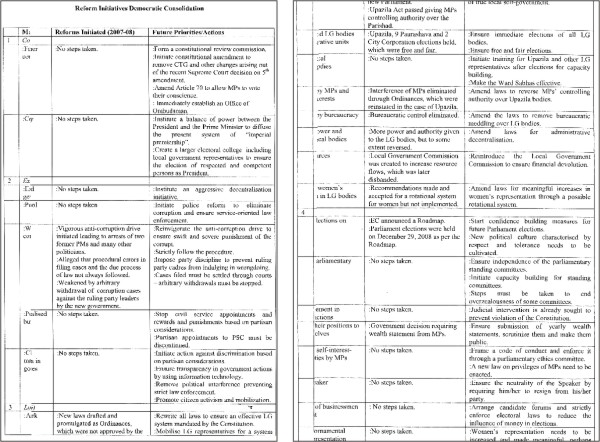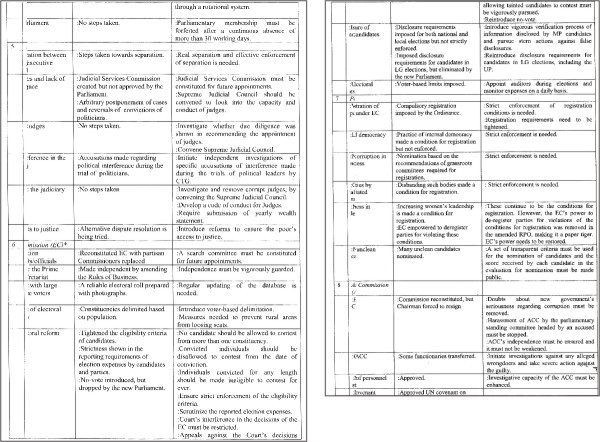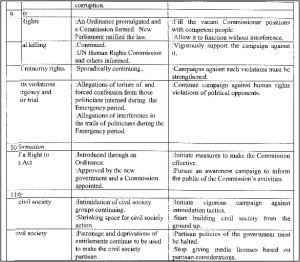Reforms for democratic consolidation
Dr. Badiul Alam Majumdar
THE spirit of democracy cannot be imposed from without. It has to come from within. The spirit of democracy is not a mechanical thing to be adjusted by abolition of forms. It requires change of the heart.” Mahatma Gandhi
The political landscape of Bangladesh has gone through dramatic changes during the last few years. After 15 years of continuous rule by elected governments since 1991, the democratic system collapsed: an army-backed Caretaker Government (CTG) took over, a state of emergency declared, and the parliamentary elections scheduled to be held on January 22, 2007 were postponed. After nearly two years of rule by a non-elected government, the elections to the 9th Parliament were finally held on December 29, 2008. The elections, considered to be free and fair by major national and international observers, led to a democratic transition. However, a democratic transition does not necessarily guarantee democratic consolidation, although achieving such consolidation must be the priority for Bangladesh for the coming years. Democratic consolidation, it must be noted, requires an appropriate legal framework and a set of vibrant institutions to enforce the laws and hold especially the executives to account.
During the two year reign of the caretaker government, there have been efforts to make many momentous changes and sweeping reforms. CTG, for example, promulgated over 120 ordinances to codify the reforms. However, the newly elected Grand Alliance government, led by Bangladesh Awami League, ratified less than a fourth of those Ordinances, reversing many of the advances already made.
We list below, in a tabular form, the major reform initiatives of the Caretaker government. We have also identified potential priorities and additional reform initiatives for the coming years to address democratic deficits. It must be noted that some of these priorities are for the government to institute while others are for civil society groups and individual citizens to initiate.
Summary of near term
priorities
As shown above, significant reforms have taken place in Bangladesh during the caretaker government, although some the advances have been reversed by the newly elected government. Now if we are to overcome the deficits in order to institutionalise our democratic system, the progress already made must be built upon and, in the coming years, new initiatives must be pursued in previously neglected areas.
The priorities thus identified may be summarised as follows:
* Review and revise constitutional provisions in order to do away with “imperial premiership,” which is inconsistent with a democratic system characterised by adequate checks and balances. Elevate the position and prestige of the presidency by making it more than ceremonial. To that end, amend the Constitution requiring the President to be elected by a larger electoral college consisting of both MPs and elected local representatives, rather than being handpicked by the leaders of the ruling party.
* Ensure a total democratic polity by creating a system of vibrant local democracy through elected local government bodies at each administrative unit and by freeing those bodies from the controlling authority of MPs and the bureaucracy. These local government bodies must, of course, be autonomous as well as transparent, responsive, inclusive and accountable to the people. Needless to say, promoting local democracy will be consistent with a system of decentralised governance, which must also be a top priority for Bangladesh in the coming years.
* Formulate an all-encompassing agenda of systemic and institutional reforms so that the Caretaker Government system could be removed before the election of the 11th Parliament, and the elected government, after expiry of its term, could play the caretaker role during elections.
* Ensure the effectiveness of Parliament by focusing the energies of MPs on legislative matters and oversight functions and by requiring the neutrality of the speaker. Enhance legislative skills of the MPs and the quality of the deliberations in the Parliament so that important policy issues are truly addressed and the Parliament becomes more than a rubber-stamping body. Amend Article 70 of the Constitution, which prevents MPs from voting their conscience. Formulate a code of conduct for MPs requiring them to identify their areas of conflicts of interest; enforce the code through a Parliamentary Ethics Committee; enact law on parliamentary privilege; ensure the declaration wealth by MPs; and severely penalise parliamentary boycotts. Create a citizens watchdog body to monitor the performance of the Parliament. Ensure that only those who are genuinely interested in public service are nominated to be elected to the Parliament in the future. Re-introduce no-vote. Eliminate the influence of money and muscle on elections.
* Initiate judicial reform to enhance people's confidence in the institution. To achieve such a goal: remove any partisan and incompetent judges; stamp out corruption from the system; ensure the use of due diligence and transparent criteria in future appointments of judges; and provide the poor and the disadvantaged with access to justice.
* Initiate administrative reforms to make the bureaucracy non-partisan, effective and efficient, to infuse the spirit of public service, and to do away with clientalism. Police reform must also be a part of this reform agenda.
* Strengthen the Election Commission by giving it the necessary power and authority to initiate the required electoral reforms for holding free and fair elections; enforce the influence of money on elections; enforce the disclosure requirement laws; and take stern actions against candidates and parties for flouting the laws, rules and the codes of conduct. Many of these requirements are already codified in law, and the EC must be allowed to function independently to enforce them.
* Political parties are the engines of democracy and hence genuine efforts must be made to make the parties democratic, inclusive, financially transparent and also accountable to their members. Dynastic politics must be done away with. Political parties must respect the requirements of their registration and abide by the conditions both in terms of letters and spirit. They must not act like syndicates. Governance of political parties must be professionalised and internal discipline strictly enforced. Dialogue and mutual respect among political parties must also be promoted.
* Corruption poses one of the biggest threats to democratic consolidation, and hence high priority must be given to combating the problem. Government must show its seriousness by allowing the ACC to function independently and by providing support to its work. Information technology should be used as a tool in this effort. People in high positions must not be allowed to indulge in graft and corruption with impunity. Ombudsmen should be employed in all government departments to address citizens' grievances, including against wrongdoing by functionaries.
* Human rights violations, especially violations of the rights of the poor, minorities, disadvantaged and political opponents must be stopped. Campaigns against extra-judicial killings must be intensified. Poverty is, of course, the biggest affront to human rights and human dignity, and must be addressed by creating opportunities for the poor and giving them their due share of the national resources.
* Right to Information Act must be used as a tool to empower citizens to hold the government to account. Information campaigns must be carried out to make people aware of the RTI provisions.
* Because of the extreme partisan behavior and patronage distribution of the government, civil society has been in a state of serious decline in Bangladesh, which creates a genuine threat to democratic consolidation. However, it came a long way in the past two years and was the driving force behind the monumental changes and reforms. The continuing intimidation of civil society groups must be stopped and space must be given for its meaningful functioning. Initiatives must also be taken to build civil society from ground up by mobilising all sectors of the society.
Achieving the above priorities, although absolutely necessary for democracy to take deep roots in Bangladesh, will be a daunting task. It will require ironclad political commitment on the part of the government in power as well as from other political entities. It will also require citizen engagement and activism. The civil society and the media must, of course, play pivotal roles to create public awareness by mobilising the people and instilling in them the concept of citizenship: the realisation that they too have rights and responsibilities as well as the obligation to get engaged in the democratic process.



............................................
The author is Secretary, SHUJON (Citizens for Good Government.
|



